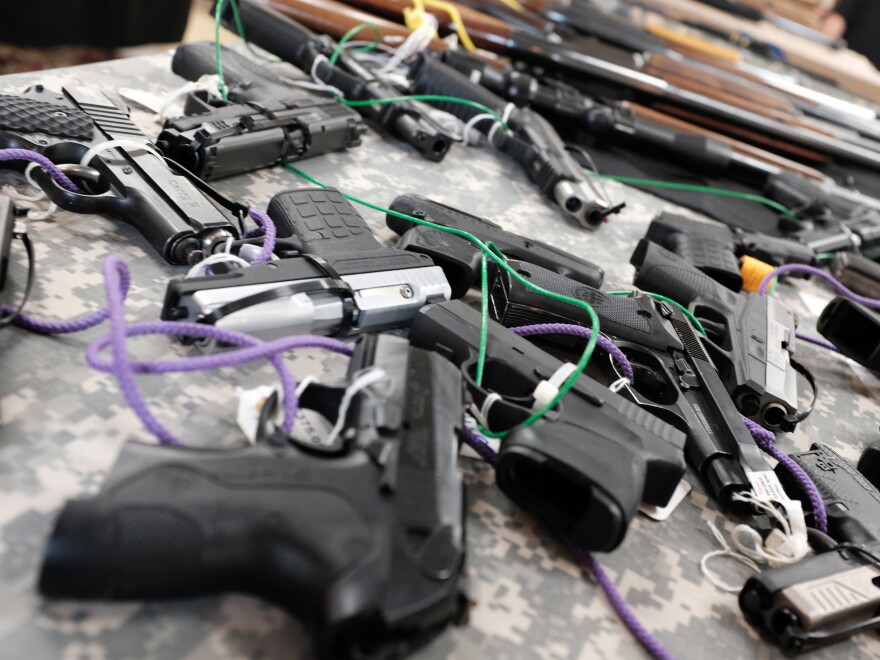Several pieces of gun-related legislation are headed to the full Michigan Senate after the bills advanced out of committee Thursday.
One subgroup of the package would require universal background checks for gun purchases. Another would encourage safe storage.
A third part would create a new “Extreme Risk Protection Order Act,” often known as a "red flag law." It aims to keep guns from people whom a court has deemed a threat to themselves or others.
Dr. Michael Siegel is a researcher at the Tufts University School of Medicine. During testimony before the Senate Civil Rights, Judiciary, and Public Safety Committee, he told lawmakers that similar legislation in other states has helped lower suicides and incidents of gun violence.
“The estimated effect of this law in Indiana was a 10% reduction in firearm suicide. In Connecticut, it was a 16% reduction in firearm suicide. And overall in the U.S., looking at five states that had passed these laws, it was as a 6.4% reduction in firearm suicide,” Siegel said, citing a 2022 study.
During the hours-long meeting, opponents to the package repeatedly questioned the impact passing the bills would have in Michigan.
Tom Lambert is legislative director for the group Michigan Open Carry. He argued threatening to remove someone’s guns because they could be a danger to themselves would be counterproductive.
“The only mention about mental health in these bills is to disincentivize people that need help from seeking the help that they need,” Lambert said.
The legislation’s sponsors say it’s only one step in a broader look at improving Michigan’s mental health system.
Before advancing it from committee Thursday, lawmakers approved several changes to the package.
That includes the addition of language broadening what factors a court considers when deciding whether to grant an extreme risk protection order. It also adds ammunition to the list of items someone can’t possess while under one of the orders. Other additions in the latest version clarify that a court should look at whether someone’s mental illness makes them a danger rather than just whether they’re ill.
Senator Stephanie Chang (D-Detroit) chairs the Civil Rights, Judiciary, and Public Safety Committee. She said the legislation could still change more.
“We’re still working on incorporating feedback from various stakeholders and have a number of things we’re looking to get some further consensus on prior to a full Senate vote,” Chang said.
While Republican members of her committee outright opposed the extreme risk protection and background check bills, some asked to work more on the safe storage proposals.
Those bills would punish gun owners whose failure to properly lock up their guns leads to kids getting hold of them and causing injury or death. They would also temporarily end sales and use tax collection on safe storage devices.
The tax break bills passed out of the committee with unanimous support. But the two Republican members zeroed in on another committee-adopted version of a separate bill in the package that would end certain liability protections for gunmakers.
“I was hoping to get [to] yes on the safe storage but it’s a complete poison pill that will bankrupt any company manufacturing or even selling guns in Michigan,” Senator Jim Runestad (R-White Lake) said.
When asked about the shift after the meeting, Chang said it was an opportunity to update the state’s laws to end immunity for gun companies.
Current Michigan storage laws limits the right to sue gun and ammunition makers in some cases to just the state attorney general.
New versions of the background check legislation would mean the requirement for long guns to be licensed would only apply to future purchases. It would also clarify that minors could still hunt with a designated adult.
Olivia Troye is a former Homeland Security Advisor to former Vice President Mike Pence who also testified during Thursday’s hearing. She said revamping background check policies can save lives.
“Federal background checks are not sufficient. And you already have state permits for guns here in Michigan. So, a state background check is more efficient and provides more information than the current federal background checks,” she said.
Despite the changes to the legislation, shooting sports and other gun advocates still argued the background check bills would create problems for hunters or family members trying to share guns.
The House of Representatives pushed background check legislation to the Senate Wednesday night. The full Senate could take up its own gun bills as soon as next week.
Non-commercial, fact based reporting is made possible by your financial support. Make your donation to WEMU today to keep your community NPR station thriving.
Like 89.1 WEMU on Facebook and follow us on Twitter
Contact WEMU News at 734.487.3363 or email us at studio@wemu.org






